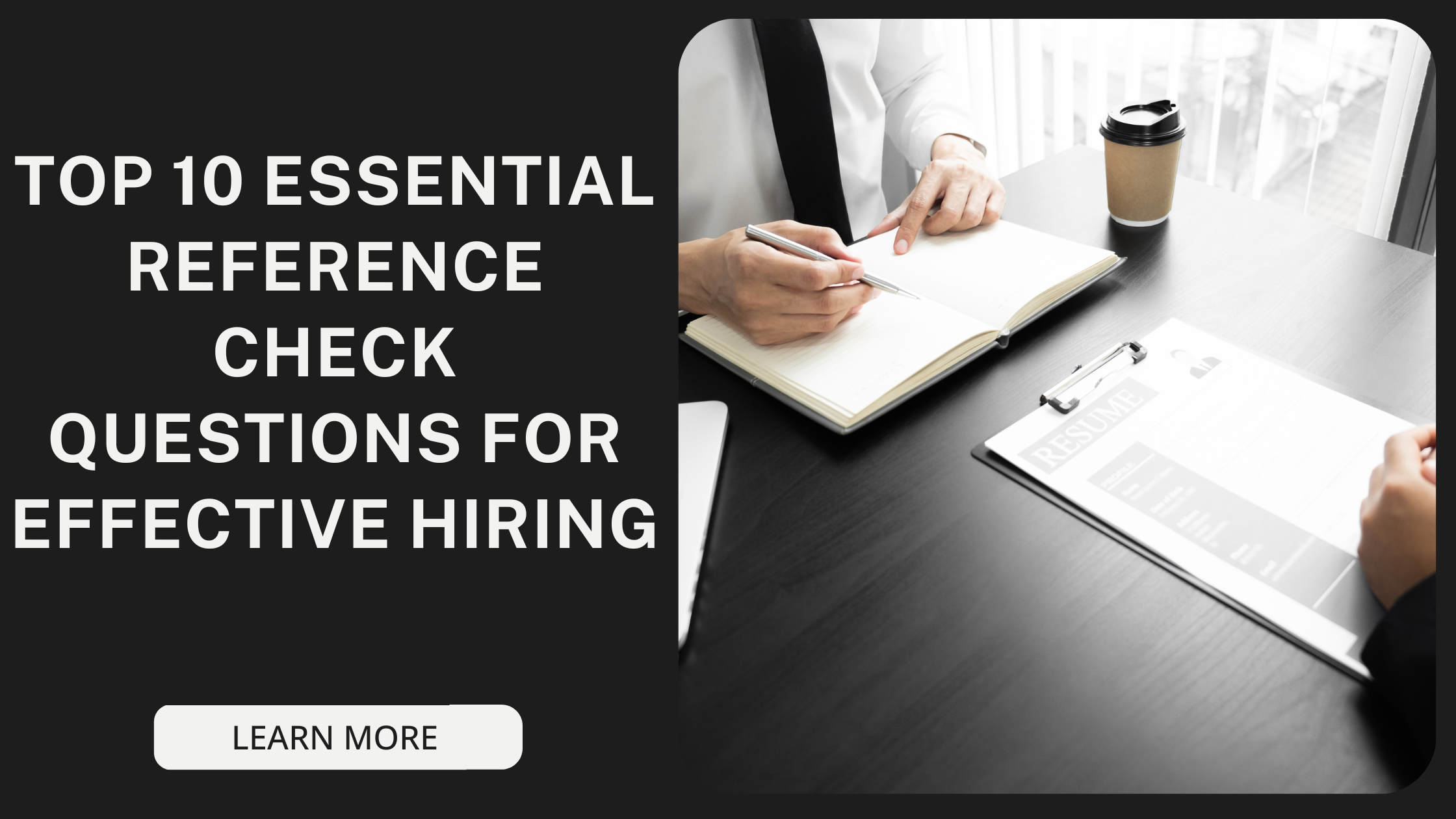Top 10 Key Reference Check Questions for Effective Hiring
Reference checks are an essential part of the hiring process, acting as a valuable tool for employers to verify claims made by job candidates and gain insight into their past work experiences. While resumes and interviews provide a foundation, reference checks offer a deeper perspective on a candidate’s performance, work ethic, and how they interact with others in the workplace. By speaking with individuals who have worked closely with the candidate in a professional capacity, employers can make more informed decisions, reducing the likelihood of hiring the wrong candidate.
Reference checks serve as a safeguard for employers, helping to ensure that new hires fit well within the company’s culture, possess the necessary skills for the job, and are capable of meeting performance expectations. They are an opportunity to confirm the accuracy of the information provided during the interview process, as well as a chance to gather qualitative insights into the candidate’s behavior, attitude, and overall effectiveness on the job. For employers, this additional layer of assessment can help mitigate risks associated with high turnover, mismatched hires, and poor cultural fit.
Types of References
To gather a complete picture of a candidate’s qualifications, it is important to check multiple types of references. Each type provides a different perspective on the candidate’s background and suitability for the position:
- Professional References: These references come from individuals who have worked with the candidate in a professional capacity, such as managers, colleagues, or clients. Professional references can speak to the candidate’s job performance, skills, and overall contribution to the team.
- Personal References: Personal references are typically non-work-related individuals, such as mentors, friends, or community leaders, who can speak to the candidate’s character and integrity. These references may provide insight into the candidate’s personal values and how they interact with others in non-professional settings.
- Academic References: Academic references can include professors, advisors, or classmates, and are often most relevant for entry-level positions or internships. These references can speak to the candidate’s academic achievements, work ethic, and potential for growth.
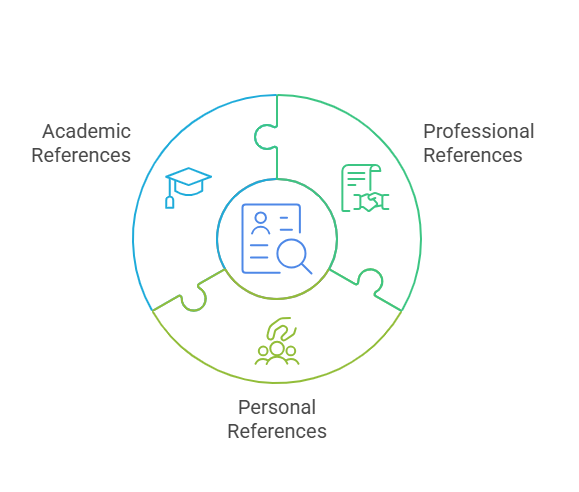
Checking all these reference types allows employers to gather a fuller picture of the candidate’s abilities, character, and fit within the company.
Why Reference Checks Are Crucial
Reference checks play a critical role in reducing hiring risks and improving the quality of hires. Here’s how they contribute to more effective hiring decisions:
- Mitigating Risks: By verifying a candidate’s work history and performance, employers can reduce the likelihood of hiring someone who is misrepresenting their qualifications or abilities. This helps in mitigating risks related to poor job performance, workplace misconduct, and bad cultural fit.
- Reducing Turnover Rates: Effective reference checks ensure that the candidate is well-suited for the role and the company’s culture, which can ultimately help reduce turnover rates. Employees who are a good match for both the position and the workplace environment are more likely to stay long-term.
- Improving Employee Quality: Reference checks provide a way to evaluate how a candidate behaves in real work situations. This can help employers make better decisions regarding job fit, ensuring that new hires are equipped to succeed and thrive in their roles.
- Assessing Cultural Fit: A candidate’s cultural fit is just as important as their technical qualifications. Reference checks help employers understand how the candidate interacts with others, how they handle workplace challenges, and whether they align with the company’s core values.
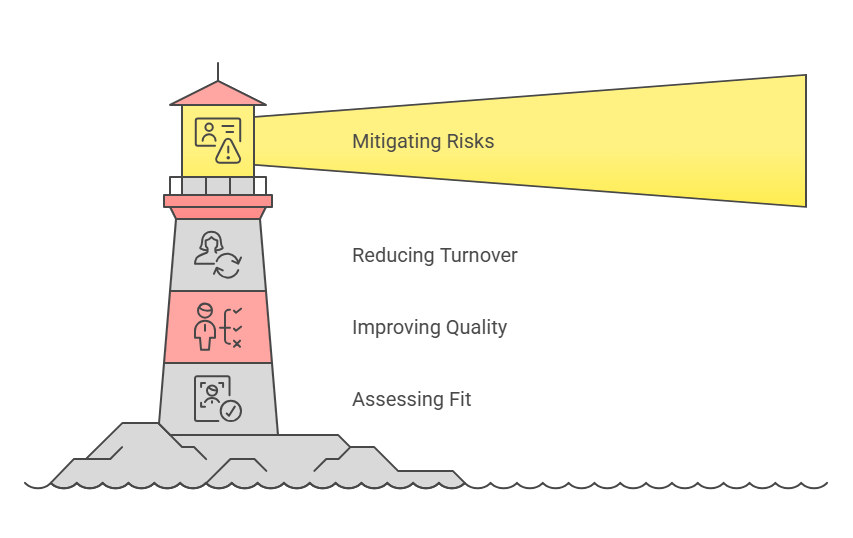
Top 10 Key Reference Check Questions for Effective Hiring 📝
When conducting reference checks, it’s essential to ask the right questions to gain valuable insights into a candidate’s qualifications, work ethic, and suitability for the role. Below is a table of the top 10 reference check questions that will help you evaluate the candidate effectively:
| Question | Purpose | Information Elicited |
|---|---|---|
| 1. How would you describe the candidate’s work ethic? 💪 | Assess work commitment | Reliability, dedication, and drive. |
| 2. Can you provide an example of how the candidate worked under pressure? ⏱️ | Assess stress management | Examples of handling deadlines, multitasking, or challenging situations. |
| 3. What are the candidate’s key strengths? 🌟 | Assess skillset | Highlights the candidate’s core competencies. |
| 4. Can you describe an area where the candidate could improve? 📉 | Assess weaknesses | Insight into growth areas and self-awareness. |
| 5. How does the candidate handle feedback and criticism? 🧠 | Assess adaptability | Reveals how the candidate accepts and learns from feedback. |
| 6. Can you provide an example of how the candidate worked in a team? 🤝 | Assess teamwork and collaboration | Insight into the candidate’s ability to work with others. |
| 7. How does the candidate manage time and prioritize tasks? 🗂️ | Assess organizational skills | Information on time management, prioritization, and efficiency. |
| 8. What was the candidate’s biggest achievement in their role? 🏆 | Assess accomplishments | Highlights past successes and the impact of their work. |
| 9. How does the candidate handle conflicts with colleagues or clients? ⚖️ | Assess conflict resolution | Insight into the candidate’s approach to resolving disputes. |
| 10. Would you rehire the candidate? Why or why not? 🔄 | Assess overall performance | Provides an overall evaluation and insight into the candidate’s potential. |
Why These Questions Matter
These questions are designed to provide employers with specific, actionable insights that help evaluate whether a candidate is a good fit for the role, team, and company culture. By asking the right questions, you can uncover valuable information that goes beyond resumes and interviews, ensuring you make informed and effective hiring decisions.
RapidHireSolutions vs. Other Background Check Providers
In today’s competitive job market, background checks are a key element in ensuring the best candidates are hired. However, not all background check providers are created equal. As companies look for ways to streamline their hiring process while ensuring compliance and accuracy, RapidHireSolutions stands out for its use of AI-driven background checks. By using state-of-the-art technology, the company provides fast, reliable, and compliant services that empower employers to make informed decisions.
When comparing RapidHireSolutions to other background check providers, it is important to evaluate several key factors: accuracy, compliance, turnaround time, cost-effectiveness, and ease of use. Below, we break down how RapidHireSolutions stacks up against competitors on these critical points.
Pros & Cons Table: RapidHireSolutions vs. Competitors
| Factor | RapidHireSolutions ✅ | Competitors ❌ |
|---|---|---|
| Accuracy | Highly accurate with AI-driven technology ensuring data consistency and thorough vetting. | Often prone to human error and may not fully integrate new data sources. |
| Compliance | Fully compliant with state-specific regulations, EEOC guidelines, and the Fair Credit Reporting Act (FCRA). | Varies by provider; may not always stay up-to-date with legal requirements, especially in different states. |
| Turnaround Time | Delivers results in 24 hours, helping employers speed up the hiring process. | May take 15–20 days or longer for completion, causing delays in recruitment. |
| Cost-Effectiveness | Offers competitive pricing for a comprehensive service. | Pricing may vary and is often more expensive due to slower processing times and manual checks. |
| Ease of Use | User-friendly interface with seamless integration into HR software. | Some competitors may have outdated platforms that complicate the background check process. |
Overview of RapidHireSolutions Services
RapidHireSolutions offers a comprehensive suite of reference check services designed to help employers hire with confidence. Leveraging cutting-edge AI technology, the company ensures that all background checks are thorough, accurate, and compliant with local, state, and federal regulations. The key strength of RapidHireSolutions lies in its ability to deliver results quickly—usually within 24 hours—while maintaining a high level of accuracy and compliance.
The AI-powered platform used by RapidHireSolutions provides automated background checks, which significantly reduce the possibility of errors often associated with manual processing. This enables employers to make faster, data-driven hiring decisions, minimizing the risks of bad hires that could negatively affect the company culture and productivity.
Turnaround Time Comparison Table
| Provider | Turnaround Time |
|---|---|
| RapidHireSolutions | 24 hours |
| Competitor A | 15–20 days |
| Competitor B | 15–18 days |
| Competitor C | 10–14 days |
RapidHireSolutions‘ quick turnaround time makes it the ideal choice for companies seeking to hire swiftly without sacrificing accuracy or thoroughness. Unlike competitors who may take several weeks to complete background checks, RapidHireSolutions’ streamlined process ensures that employers can move forward with the hiring process promptly.
Analysis: Why Compliance with Hiring Regulations is Important
Compliance with hiring regulations is not just a matter of following the law—it’s essential to maintaining trust and fairness in the hiring process. In particular, reference checks are subject to various regulations at both the state and federal levels, including the Fair Credit Reporting Act (FCRA), EEOC guidelines, and state-specific ban the box laws. Failure to comply with these regulations can expose employers to legal liability and tarnish the company’s reputation.
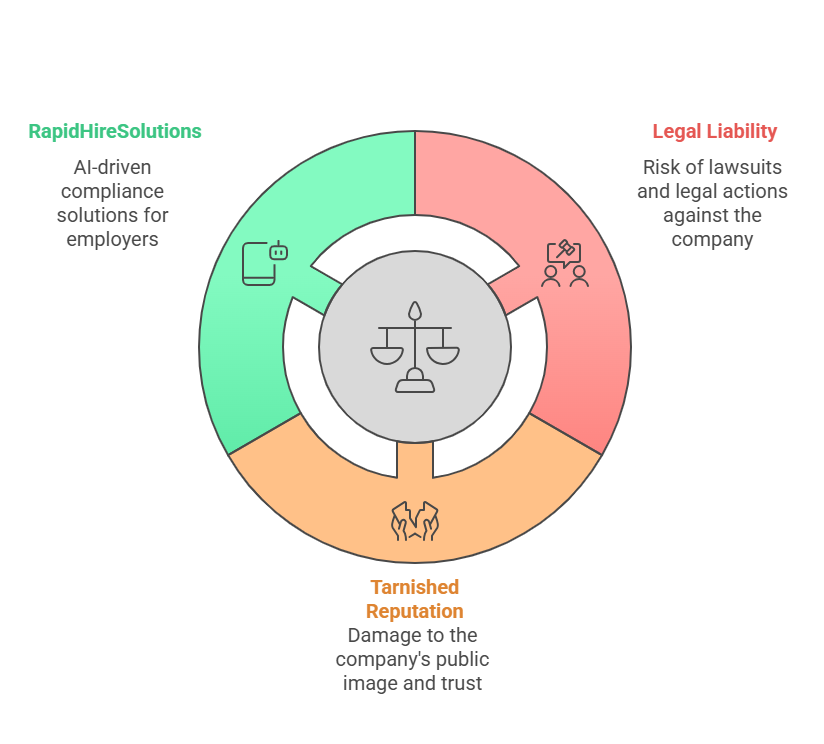
RapidHireSolutions ensures that all reference check services adhere to the latest legal requirements, making it easier for employers to navigate the complexities of state-specific regulations. By integrating AI-driven solutions that automatically track changes in regulations, RapidHireSolutions helps ensure that employers remain in full compliance, minimizing the risk of legal issues during the hiring process.
Pros & Cons Section: RapidHireSolutions vs. Competitors
| Pros for RapidHireSolutions ✅ | Cons for Competitors ❌ |
|---|---|
| 1. Fast, accurate, and compliant background checks. | 1. Slow turnaround times, causing delays in hiring. |
| 2. AI-powered technology enhances accuracy and efficiency. | 2. Limited automation results in increased manual workload. |
| 3. Full compliance with state-specific hiring regulations. | 3. Risk of non-compliance with constantly changing laws. |
| 4. User-friendly platform integrates seamlessly with HR systems. | 4. Clunky, outdated platforms that complicate the hiring process. |
Additional Insights: Advantages of AI-Driven Background Checks
The use of AI-powered reference check services offers numerous benefits over traditional manual processes. AI enhances the speed, accuracy, and efficiency of background checks, significantly reducing the likelihood of human error. By leveraging vast datasets and advanced algorithms, AI can identify patterns and provide deeper insights into a candidate’s history and behavior.
Furthermore, state-specific legal compliance can be a complicated area for HR professionals. With regulations differing from state to state, it’s essential to stay up-to-date on the latest legal guidelines. RapidHireSolutions‘ AI-driven platform ensures that every background check is fully compliant, helping employers navigate the complex web of local and federal laws without the risk of costly mistakes.
In conclusion, AI-powered background check services are not just a trend—they’re the future of efficient, accurate, and legally compliant hiring. With RapidHireSolutions, employers can ensure they’re hiring the right candidates while adhering to the highest standards of compliance.
Legal Aspects of Reference Checks
When it comes to conducting reference checks, it’s essential for employers to be aware of various legal guidelines that govern the hiring process. These regulations are designed to ensure fairness, protect the rights of candidates, and help employers avoid discriminatory practices. Reference checks are an invaluable tool, but they must be carried out within the boundaries of the law.
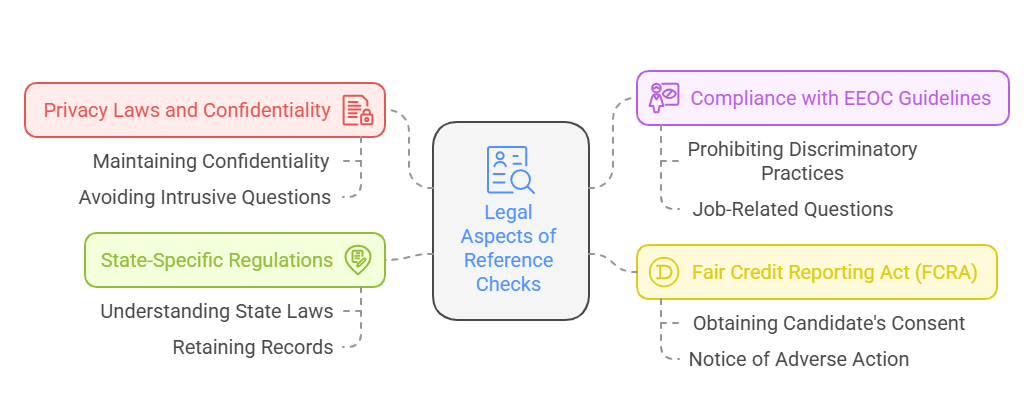
Privacy Laws and Confidentiality
Employers must be cautious about maintaining confidentiality when conducting reference checks. Many states have specific privacy laws that protect personal information. For example, employers should refrain from asking overly intrusive questions that do not relate to a candidate’s ability to perform the job. Questions about personal life, religion, or family status may violate privacy rights and could lead to legal ramifications.
In addition to protecting the privacy of candidates, employers must also ensure they keep the information from reference checks confidential. It should not be shared with other employees, nor should it be used for purposes outside the hiring decision. Any breach of confidentiality could result in legal challenges or even fines.
Compliance with EEOC Guidelines
The Equal Employment Opportunity Commission (EEOC) enforces federal laws that prohibit employment discrimination. These guidelines apply not only to the hiring process but also to the reference check process. Employers are prohibited from using discriminatory practices based on race, color, national origin, sex, disability, or religion when conducting reference checks.
For instance, when requesting references, it’s important that employers ask relevant, job-related questions. Asking a reference about a candidate’s race, gender, or any other protected characteristic could result in claims of discrimination. Employers must also be mindful of ban-the-box laws, which restrict when and how a candidate’s criminal record can be considered in the hiring process. If a reference check touches upon any of these areas, employers could face legal consequences.
Fair Credit Reporting Act (FCRA)
The Fair Credit Reporting Act (FCRA) regulates how employers use background checks and reference check information, ensuring the accuracy and fairness of the process. Under FCRA, employers must obtain a candidate’s consent before conducting reference checks. This includes not just obtaining a signed consent form but also notifying the candidate that a reference check will be part of the hiring process.
Moreover, if the reference check leads to an adverse action (e.g., a job offer being rescinded), employers are required to provide the candidate with a notice of adverse action. This notice includes a copy of the reference check report and a statement explaining the candidate’s rights under the FCRA, including the right to dispute inaccurate information.
State-Specific Regulations
In addition to federal guidelines, many states have their own laws that regulate reference checks. These laws can vary significantly, so it’s crucial for employers to understand the specific rules in the states where they operate. Some states, for example, restrict the types of questions that can be asked during a reference check. Others may have specific requirements on how long reference check records must be retained.
For example, in California, employers are prohibited from asking for certain details about a candidate’s criminal history until a conditional job offer has been made. New York has specific ban-the-box regulations that prevent employers from asking about a candidate’s criminal record on job applications. Understanding these state-specific rules is crucial to maintaining legal compliance.
FAQ Section (5 Questions & Answers)
Can I ask references about a candidate's weaknesses?
Yes, you can ask about a candidate's weaknesses, but the question must be job-related. It's important not to ask questions that are discriminatory or unrelated to the position.
How do I ensure my reference checks comply with laws?
To ensure compliance, always obtain written consent from the candidate, avoid discriminatory questions, and follow relevant privacy and FCRA guidelines. Also, stay updated on state-specific laws that may affect the reference check process.
What should I do if a reference gives negative feedback?
Negative feedback should be carefully considered, but it’s essential to evaluate it in context. Make sure the feedback is directly relevant to the candidate's job performance and is consistent with other parts of the candidate's application. If the feedback is significant, consider following up with additional references.
How do I verify that a reference is legitimate?
To verify a reference’s legitimacy, cross-check the reference’s contact information and confirm their relationship with the candidate. It’s also helpful to look for references that are familiar with the candidate's work performance and can speak to their qualifications in detail.
What other methods can I use to supplement reference checks?
In addition to reference checks, consider using background checks, skills assessments, or personality tests to get a fuller picture of a candidate’s suitability for the position. These tools can help confirm the information provided by references.
Conclusion
In today’s competitive hiring environment, reference checks play a vital role in ensuring employers make informed decisions and hire the best talent. By asking the right questions and ensuring compliance with legal regulations, employers can gain valuable insights into a candidate’s qualifications, work ethic, and cultural fit.
As demonstrated in this article, RapidHireSolutions offers a fast, efficient, and compliant solution for conducting reference checks. By leveraging cutting-edge technology, RapidHireSolutions ensures that your reference checks are accurate, legally sound, and tailored to your company’s needs.
By implementing AI-powered solutions, RapidHireSolutions helps employers save time, reduce errors, and remain compliant with state and federal guidelines. This not only improves the hiring process but also enhances the overall quality of new hires.
As a business, staying up-to-date with the latest trends in reference checks and hiring regulations will ensure a more streamlined and effective hiring process. With RapidHireSolutions, employers can be confident in their hiring decisions and rest assured that they are compliant with the law every step of the way.

